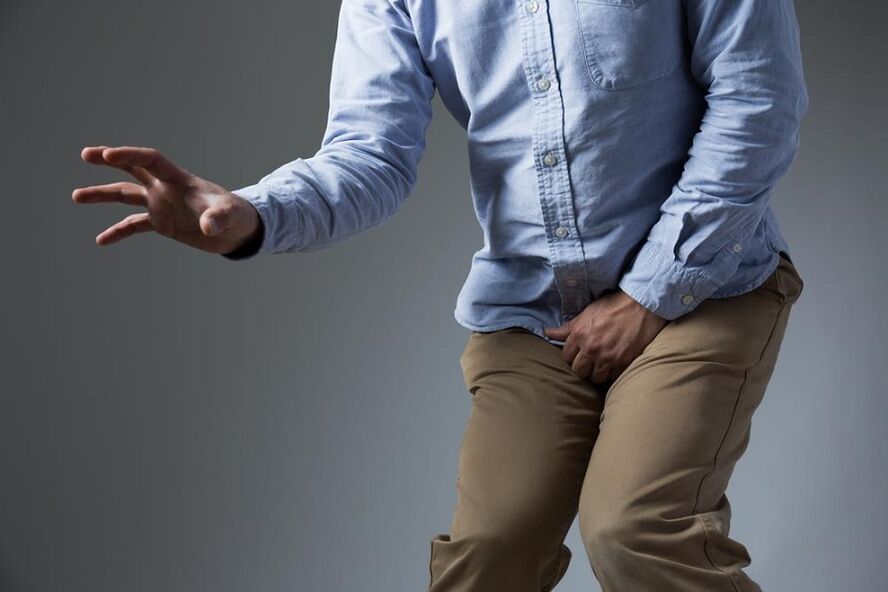Prostatitis is the most common male disease and is very misleading.Prostatitis is often transformed into a chronic form, precisely because its first symptoms remain unnoticed.They can be expressed to varying degrees, alone or at the same time.One thing is important: you need to know them in time to recognize and consult a doctor.
Symptoms of acute prostatitis

In most cases, the clinical picture of acute prostatitis is very similar.Of course, there may be individual characteristics, but they do not prevent experienced doctors from accurately recognizing the enemy.Signs are customary to divide into groups:
General manifestations
- The increase in temperature is most often significant.
- Decomposition: weakness, malaise, fatigue, decrease in physical activity.As a result, a decrease in performance.
- Laboratory indicators: The results of blood and urine tests indicate the presence of an inflammatory process.
The sum of these properties is not unique to prostatitis - this can manifest inflammatory diseases of other small pelvis.The image becomes much lighter with the appearance of local symptoms.
Local symptoms
- Inconvenience in the groin.Appears with physical or sexual activity after a while after calm.The discomfort is manifested in the form of itching, burning, blasting in the groin or urethra.
- Pain in perineum, groin, testicles.In pain syndrome, discomfort develops rapidly.Its intensity is proportional to the intensity of the inflammatory process and can also show the cause of the infection is the cause of prostatitis.
- Mucosal discharge.Transparent or whitish, appears in the initial stages.Prove for the pronunciation of inflammation.
- A mixture of blood.Most often they are found in the form of hematospermia - with blood or flooded at the end of urination.Occasionally spontaneous mucosal secretions are possible with the blood mixture.
- Constipation.Due to the anatomical proximity, inflammation of the prostate gland also affects the gastric intestinal system.
- Heavy urination.Originally manifested by incomplete emptying of the bladder and the need for pushing.Then there is a weakness of the urinary tract, which may turn into the impossibility of independent urination when it is full of bladder.
Intimate disorders

Often the most painful are the problems of the intimate sphere.Progressive prostatitis gradually reduces the reduction of sexual activity and weakens libido.Psychological problems connect to physical problems and, together with inevitably erection dysfunction.
Symptoms of chronic prostatitis
During the aggravation phase, clinical manifestations are similar to the symptoms of acute prostatitis.There are some degrees of offenses present in the remission phase.As a general rule, the symptoms strive.
Asymptomatic form
Asymptomic prostatitis - the phenomenon is quite rare.The disease has a long time without characteristic symptoms: no pain, no problem with urination, no weakness, the temperature is normal.This occurs when immunity is high.As immunity is reduced, characteristic symptoms of prostatitis are manifested.
The lack of signals from the body interferes with the timely diagnosis and therefore with successful treatment.Such prostatitis is detected randomly.Therefore, it is important to conduct a medical examination regularly, even if nothing is disturbed.
Characteristics of treatment
Most importantly, there is no medicine in itself!Only a doctor (urologist, andrologist) can result in an accurate diagnosis based on the patient's complaints, examination, various analyzes and examinations.
In the case of acute prostatitis, the purpose of the treatment is to prevent the disease from being transformed into a chronic form.But even if prostatitis is chronic, you should not be desperate: adherence to properly selected treatment and your doctor's recommendations will result in a long remission and significant aggravation.
The composition of the complex therapy of acute and chronic forms of prostatitis necessarily includes drugs to restore prostate functions.Most often these are candles.The drugs have a systemic effect: improve microcirculation and blood supply, relieve swelling and venous stagnation, remove inflammatory phenomena, restore tissues and prostate functions.
Thanks to the introduction of candles, the treatment order not only reduces therapy (up to 10 days), but also increases the conditions for remission.































